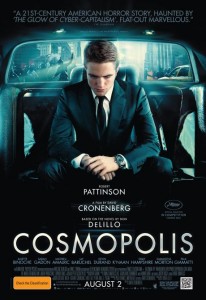A musing on our troubled economic times as only David Cronenberg could tell it: inside of a limousine with the odd giant rat.
Director: David Cronenberg
Writer: David Cronenberg
Runtime: 109 minutes
Starring: Robert Pattinson, Paul Giamatti, Samantha Morton, Sarah Gadon, Mathieu Amalric, Juliette Binoche
Distributor: Icon
Country: Canada
Rating (?): Better Than Average Bear (★★★½)
Although known for his pioneering work in the realm of “body horror”, Canada’s David Cronenberg has shown an equal fascination with the limits of the human mind. In last year’s A Dangerous Method, he addressed the preoccupations of the psyche more directly, exploring Carl Jung and Sigmund Freud’s very awakening to the concepts of psychoanalysis and dream interpretation. Yet it is equally true that the director has long been enthralled with the meeting of machine and body, and with Cosmopolis, based on Don DeLillo’s novel of the same name, he muses on the union of all three of these totems in the context of the global financial crisis.
Cosmopolis has a freewheeeling and disjointed narrative, but primarily focuses on 28-year old billionaire Eric Packer (Robert Pattinson) as he travels across a New York City in chaos to get a haircut. He keeps his watchful eye on the yuan, as it rallies despite his bet against it, resulting in great personal financial loss to himself. As his empire crumbles, the real world begins to invade his high-tech cocoon and his paranoia increases at the same rate as the actual threats to his life. In many ways, this is Cronenberg emerging from the other side of his own eXistenZ (1999), quarantining Packer from reality, his virtual world now his tomb rather than being one of symbiosis.
Films about the nature of capitalism have become prevalent since its apparent stumbling of the last few years, but none have explored the nexus between the organic, the psychological and the technological. In the 21st century, body, mind and machine are inexplicably intertwined, creating an arena in which we are simultaneously in a state of ubiquitous connectivity and yet more alone with our thoughts than ever. Cosmopolis may not be the first film to try to guide us through the digital morass, but it posits itself as a type of narrative that aims to acknowledge the failure of machine and man to psychologically carry us through the darkest chapters of our corporate history.
Robert Pattinson makes a complete break from his fangy persona, in a role that is more likely to repulse his legion of fans than it is to shock them. It is a measured performance, tightly under the rein of Cronenberg, but that is true of the rest of the cast as well. The stilted and existential conversations between Packer and a stream of business associates (including Samantha Morton), lovers (such as Juliette Binoche), wife of convenience (Sarah Gadon) and other professionals is as cold and calculated as his business dealings, at odds with the growing anarchy outside. As something resembling the Occupy movement mounts, and threats are made against Packer’s life, Packer is duly influenced, plunging himself into a personal chaos and spiral of self-destruction.
Cosmopolis is a difficult film to penetrate, but this is only partly due to the deliberate way in which it was constructed. Cronenberg treads a fine line between portraying isolation and actually detaching his film completely from audiences, but his curious mixture of sci-fi sheen with real-world problems grounds Cosmopolis in a way that a surface scan may not reveal. The implication is that the corporate disengagement from reality is partly to blame for the financial crisis, but far more fundamental is the wider apathy that has allowed this to happen.
Cosmopolis is released in Australia on 2 August 2012 from Icon Distribution.





